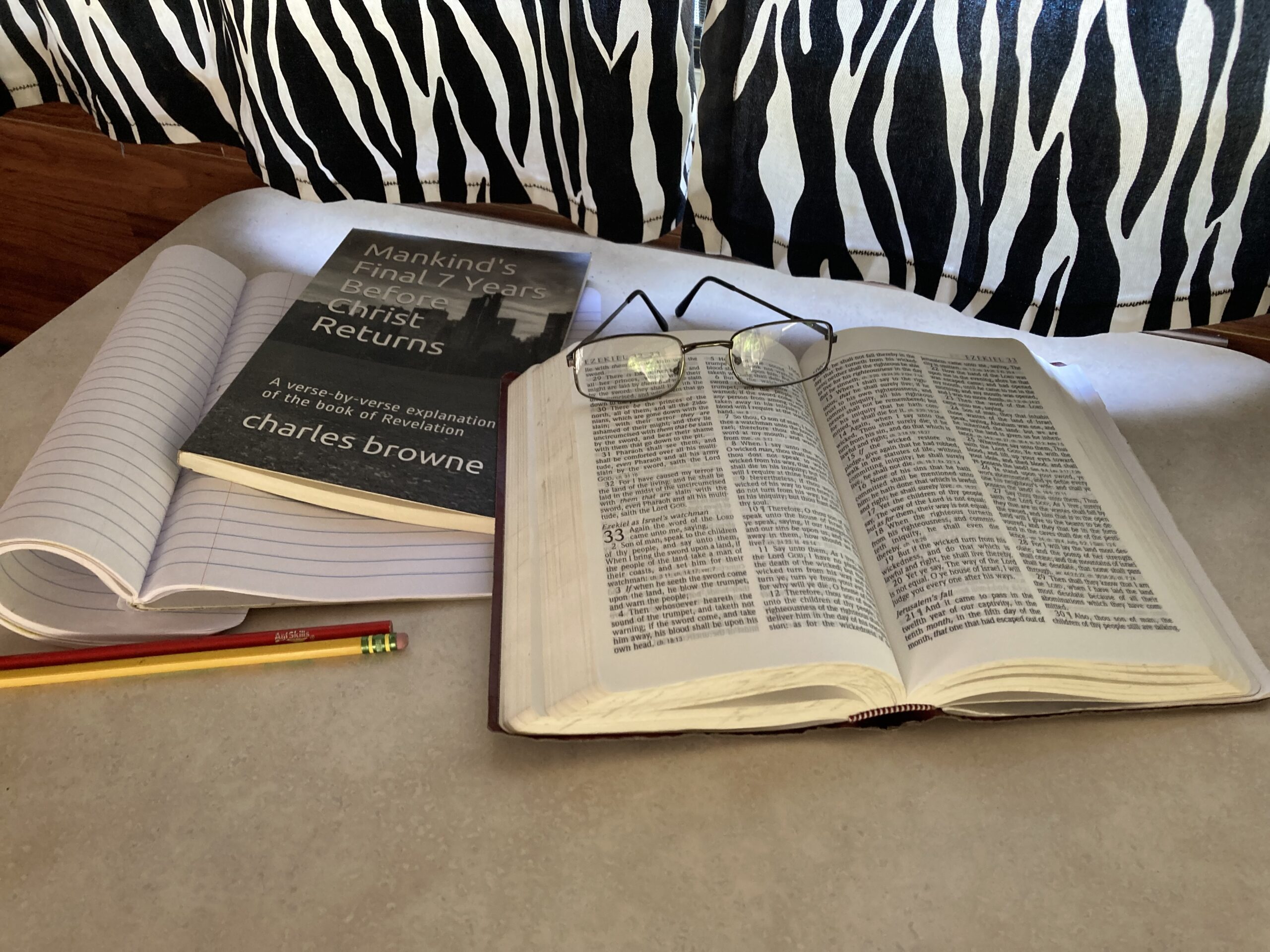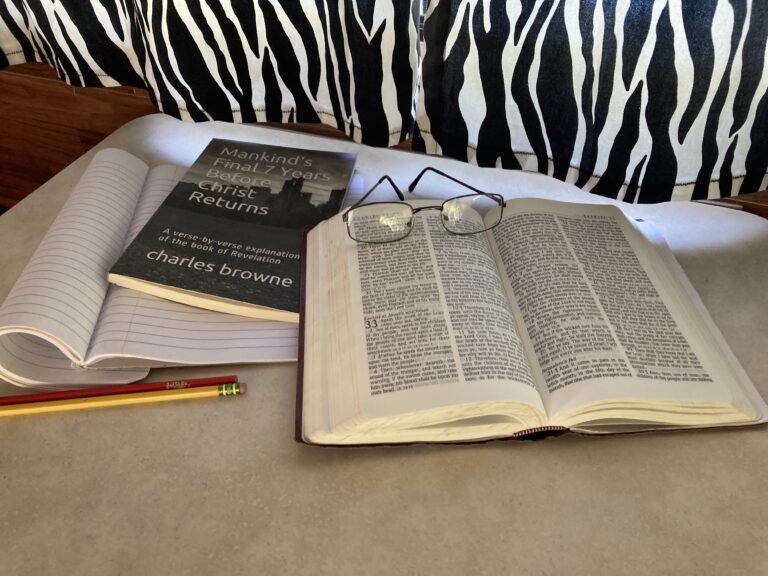THE BOOK OF DANIEL, Chapter 1
[This is an excerpt from my book, Mankind’s Final 7 Years Before Christ Returns: A verse-by-verse explanation of the book of Revelation]
The book of Daniel can be divided into two parts. The first six chapters are mostly historical; and the last six chapters are mostly prophetical. Parts of the book of Daniel (Dan. 2:4-7:28) are written in the Chaldee language, and the rest is written in Hebrew. There are a few opinions as to why it is, but it does offer proof of the book’s authenticity. In fact, Jesus called Daniel a prophet, and quoted from the book a number of times (Matthew 24:15; Mark 13:14).
1 In the third year of the reign of Jehoiakim king of Judah came Nebuchadnezzar king of Babylon unto Jerusalem, and besieged it.
Skeptics are quick to point out the apparent contradiction between this verse, and Jeremiah 25:1 which says this occurred in the fourth year. There are a few views which would reconcile our confusion between these two verses. One is that Daniel wrote these verses some time after becoming a high official in Babylon, and used the Babylonian method of reckoning which would make it after three complete years. Another is that Nebuchadnezzar marched from Babylon (where Daniel lived) in the third year, and arrived in Jerusalem (where Jeremiah lived) in the fourth year.
But the bottom line is that both Daniel and Jeremiah lived through that time, and both knew what they were writing, and it made sense to each one. There are no contradictions in the Bible, there are simply some things we don’t fully understand. The Bible never contradicts itself, but our understanding of one verse may contradict our understanding of another verse.
For more information on Jehoiakim, read 2 Kings 23:28-24:6; 1 Chronicles 3:15-16; 2 Chronicles 36:4-8; Jeremiah 22:17-19; 26:20-23.
2 And the Lord gave Jehoiakim king of Judah into his hand, with part of the vessels of the house of God: which he carried into the land of Shinar to the house of his god; and he brought the vessels into the treasure house of his god.
Nebuchadnezzar bound Jehoiakim in fetters with the intention of taking him captive to Babylon, but apparently changed his mind and only took some of the vessels from the temple (2 Chronicles 35:6-7; 2 Kings 24:1) to be put in the temple of his false god in Babylon. The Lord gave this to Nebuchadnezzar (Daniel 2:37-38; 5:18) as a punishment to Judea (Jeremiah 25:1-11; Zechariah 5:5-11).
Nebuchadnezzar took parts of the temple vessels on two occasions, and on a third time he took the entirety. This was the first (see also- 2 Chronicles 36:1-7). The second was during the reign of Jehoiachin, the son of Jehoiakim (2 Chronicles 36:10; 2 Kings 24:6-16). (See also- Jeremiah 27:18-22)
Shinar was the ancient name for the region of Babylon (Genesis 10:10).
3 And the king spake unto Ashpenaz the master of his eunuchs, that he should bring certain of the children of Israel, and of the king’s seed, and of the princes;
4 Children in whom was no blemish, but well favoured, and skilful in all wisdom, and cunning in knowledge, and understanding science, and such as had ability in them to stand in the king’s palace, and whom they might teach the learning and the tongue of the Chaldeans.
Though the KJV uses the word “children”, the word literally means young men. There is much debate as to the age of these young men, but most think they were around the ages of 12-17. Note that the verse says, “and such as had ability in them to stand in the king’s palace”. I believe that this refers to age, as well as other traits.
The purpose of taking these selected children seems to be: 1. as a show of victory, 2. that they might serve as hostages to ensure the loyalty of the leaders of Israel and, 3. that they might be an asset in their service to Babylon.
The Chaldeans were greatly interested in “science”, which could include astronomy, architecture, agriculture, music, and a number of other subjects. The word is usually translated as “knowledge”. I believe that it was from this region that the wise men of the Christmas story (Matthew 2:1-12) would eventually come. I also believe that Daniel’s prophecies would play a great role in their knowledge of the newborn king.
5 And the king appointed them a daily provision of the king’s meat, and of the wine which he drank: so nourishing them three years, that at the end thereof they might stand before the king.
This appears to be both so as to ensure their health, and to entice them to embrace their new position. (See also- 1 Kings 4:22)
6 Now among these were of the children of Judah, Daniel, Hananiah, Mishael, and Azariah:
7 Unto whom the prince of the eunuchs gave names: for he gave unto Daniel the name of Belteshazzar; and to Hananiah, of Shadrach; and to Mishael, of Meshach; and to Azariah, of Abednego.
It is supposed that all these “children of Judah” were of royal lineage (Isaiah 39:5-7; 2 Kings 20:16-18) and nobility. It was common to give servants a new name (see Genesis 41:45). Their original names referred to the God of Israel; their new names referred to Babylon and its false gods (see also- Daniel 5:12). The name Belteshazzar should not be confused with the name of King Belshazzar in chapter 5, though both names apparently mean the same.
8 But Daniel purposed in his heart that he would not defile himself with the portion of the king’s meat, nor with the wine which he drank: therefore he requested of the prince of the eunuchs that he might not defile himself.
Daniel refused to blame uncontrollable circumstances, and simply comply with what he knew was wrong. The king’s meat may have been unclean according to the law of Moses. Also, it may have been previously offered as a sacrifice to false gods.Daniel didn’t just make himself a suggestion. The text literally says that he set his heart in place. Asking for permission was his first option. Death may have been the second option. (See also-1 Corinthians 10:27-28; 8:7-10; Ezekiel 4:13; Hosea 9:3).
9 Now God had brought Daniel into favour and tender love with the prince of the eunuchs.
Clinging to his own religious beliefs was actually a defiance against the king’s wishes. This verse, however, shows the reason that Daniel felt he could openly do so (see Proverbs 16:7). The word translated here as “tender love” literally means a parental love.
10 And the prince of the eunuchs said unto Daniel, I fear my lord the king, who hath appointed your meat and your drink: for why should he see your faces worse liking than the children which are of your sort? then shall ye make me endanger my head to the king.
11 Then said Daniel to Melzar, whom the prince of the eunuchs had set over Daniel, Hananiah, Mishael, and Azariah,
There is much dispute as to whether the word translated here as “Melzar” is a name or a title. It only appears elsewhere in verse 16, and refers to the same person.
12 Prove thy servants, I beseech thee, ten days; and let them give us pulse to eat, and water to drink.
The word “pulse” refers to seeds. It is thought to mean any seed-bearing plant, or perhaps any food grown from seed. (See also- Genesis 1:29).
13 Then let our countenances be looked upon before thee, and the countenance of the children that eat of the portion of the king’s meat: and as thou seest, deal with thy servants.
14 So he consented to them in this matter, and proved them ten days.
15 And at the end of ten days their countenances appeared fairer and fatter in flesh than all the children which did eat the portion of the king’s meat.
16 Thus Melzar took away the portion of their meat, and the wine that they should drink; and gave them pulse.
We are not told if their appearance was the result of a supernatural blessing from God, or simply the effect of eating according to God’s wisdom. We see, in the next verse, that God did bless them for their actions.
17 As for these four children, God gave them knowledge and skill in all learning and wisdom: and Daniel had understanding in all visions and dreams.
This knowledge and skill appears to be both natural and supernatural. Visions and dreams were the primary way God spoke to prophets in the Old Testament (Numbers 12:6).
18 Now at the end of the days that the king had said he should bring them in, then the prince of the eunuchs brought them in before Nebuchadnezzar.
At the end of the three years (verse 1:5), Ashpenaz brought in not just these four, but all the young Hebrew men.
19 And the king communed with them; and among them all was found none like Daniel, Hananiah, Mishael, and Azariah: therefore stood they before the king.
20 And in all matters of wisdom and understanding, that the king enquired of them, he found them ten times better than all the magicians and astrologers that were in all his realm.
21 And Daniel continued even unto the first year of king Cyrus.
This verse does not refer to the death of Daniel, since he was still alive in the 3rd year of Cyrus (Daniel 10:1). It refers to the fact that Daniel was still alive at the important time when Cyrus ended the Babylonian captivity of the Jews (see- Ezra 1:1-2). (See also- Daniel 6:28)
(Daniel 2)


